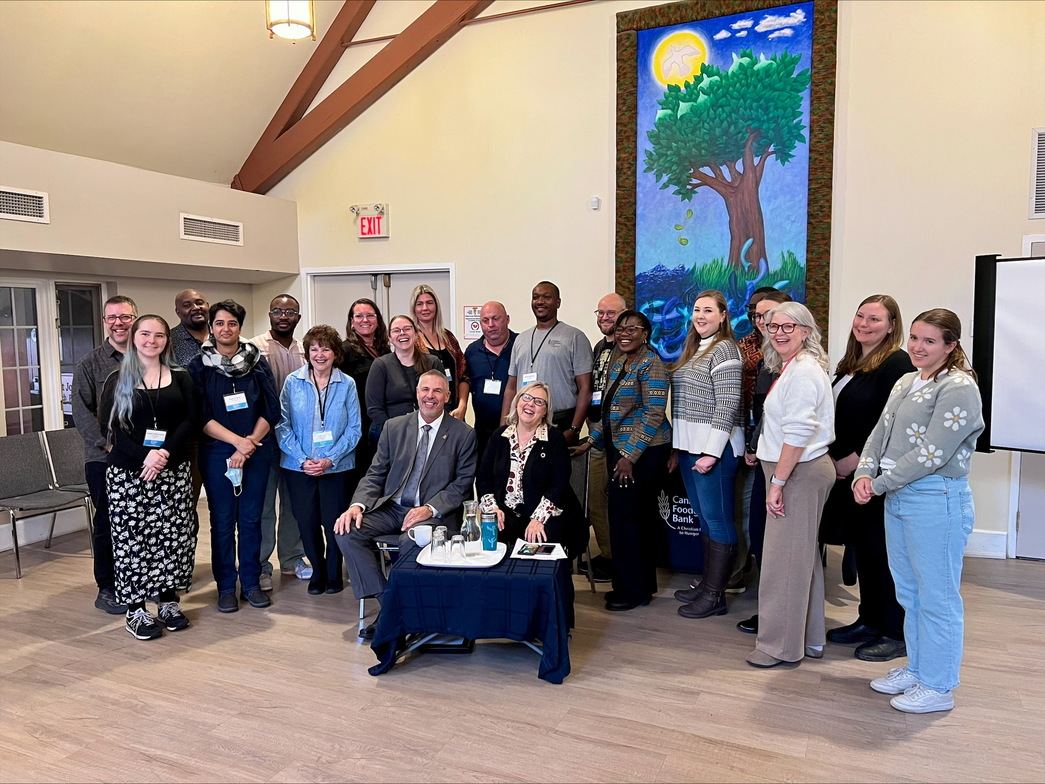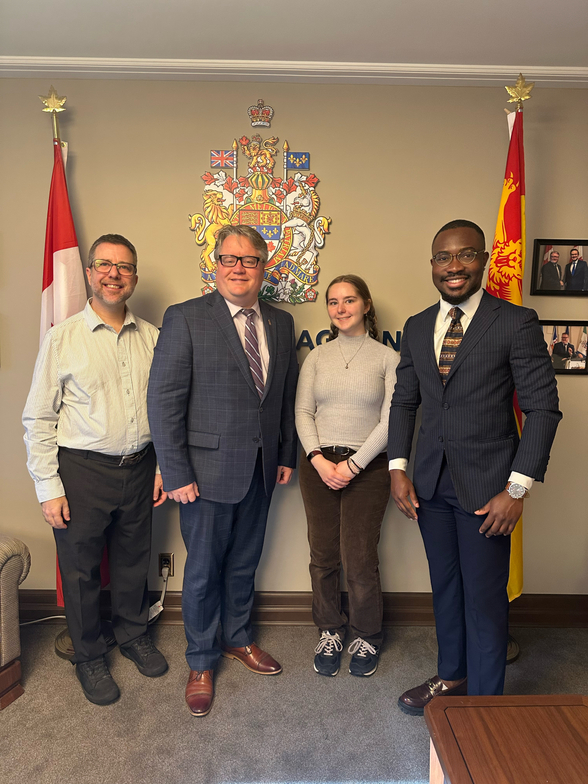photo: Kingsley Alozie and Heather Wilks Jenkins meet with MP Bardish Chagger in Ottawa
It starts with a small moment.
A newcomer enters through the “wrong” church door, unsure where to go. A parishioner notices and says, “Come sit with us.” That’s advocacy. So is the bus rider who helps a lost teen find their stop. We don’t always call it advocacy, we call it kindness. But it is advocacy: quiet, everyday, holy. It’s the retired teacher assisting with a refugee’s paperwork. The parishioner who quietly raises that someone has been absent from the pews. These are acts of intercession, standing in the gap between silence and support.
Scripture is full of such moments. Moses speaks for the enslaved. Ruth speaks for the oppressed. Paul writes on behalf of Onesimus. And today, our faith leads us also to be present in the gaps.
This past October, a small group of people from Alongside Hope, our Anglican global outreach, travelled to Ottawa in recognition of World Food Day. We went as partners with Canadian Foodgrains Bank, a coalition of 15 Christian organisations advocating not just for food, but for justice and sustainability. We met with MPs to speak on behalf of those facing hunger around the world.
We didn’t go as experts. We went as carriers of stories: of mothers in South Sudan, farmers in Uganda, children whose nutrition hangs in the balance across 30 countries. And we remembered: advocacy isn’t always loud. Sometimes it’s a story told faithfully, even when the outcome is uncertain.
Because hunger isn’t just about food; it’s about who gets heard.
For many, the word advocacy sounds uncomfortably political or too confrontational. And yet, at its heart, advocacy is simply this: speaking on behalf of others. It’s the parable of the widow knocking on the judge’s door, or Jeremiah naming the poor, or Jesus seeing the hungry crowd and saying, “Give them something to eat.”
Canadian Foodgrains Bank began in 1983 when Canadian prairie farmers shared their bumper crop with those who were starving. The movement took root and today, the Anglican Church through Alongside Hope is one of its 15 member organisations working with local partners across the world to support sustainable agriculture, emergency relief, and long-term food security. Together, our message is simple yet powerful: We can end global hunger. In fact, between 2005 and the start of the pandemic, global hunger dropped from over 800 million to under 600 million. We were well on our way. But we’ve gone in the opposite direction, for now.
When we consider the statistics, we realize these are not just numbers; they are neighbours. Every statistic is someone’s child, sibling, or parent. Each one of them is a human being, a child of God.
The harvest is under strain. The pandemic scattered supply chains. War turned breadbaskets into battlegrounds. Food prices have soared: over 20% in Canada, more than 100% in Argentina, even higher in Nigeria and Lebanon. In some places, prices rose fivefold in a single week. In many regions, nutrition is now a luxury.
When people are not fed, it encourages armed conflict and disrupts trade. But when food systems are strong, peace becomes possible. Resilience becomes real.
When we met with MPs, we were nervous. But Luke 12 reminded us: “The Holy Spirit will give you the words.” And the Spirit did. We were met with curiosity, compassion, and even prayer.
We spoke of farmers like Gladys in Uganda, who endured five years of drought. With CFGB support, she now tends a thriving farm. Her land is green again. She no longer needs our support; she’s even supporting others. That’s what restoration looks like.
Of the MPs that met with us, some were practical, asking about the many ways aid supports trade and global stability. Others were compassionate, moved by the stories we carried. One even prayed for us before the meeting ended.
Each encounter reminded us: even when advocacy involves confrontation, it is always rooted in connection. And the MPs told us clearly: they want to hear from Canadians. They rely on us to know what matters to their constituents. Your voice helps shape their priorities.
That’s where you come in.
You can send a letter to the Secretary of State for International Development using Canadian Foodgrains Bank’s online letter generator. It’s quick, easy, and impactful. The letter simply says that you care about Canada’s continued work supporting agricultural development and food security across the world.
Visit foodgrainsbank.ca/postcard to get started.
Your voice matters. Your kindness becomes policy. What we do today determines our future. Will future generations live in a just and peaceful world? It’s not out of reach. It begins with seeds: of food, of hope, of action. Because hunger isn’t just a lack of food, it’s a lack of justice. But we are a people of hope, and we believe in Good News.
Jesus said:
“For I was hungry and you gave me food,
I was thirsty and you gave me something to drink.”
“Truly I tell you, just as you did it to one of the least of these, you did it to me.”
Through this work, let us keep feeding and welcoming our Saviour, Jesus Christ.








